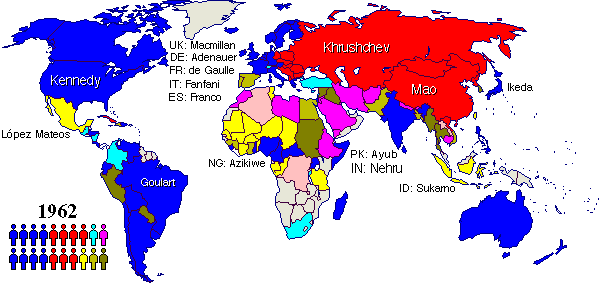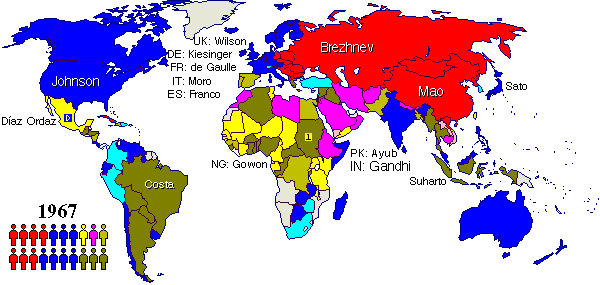



![]()

The Dumping of Africa went almost as quickly as the Scramble for Africa of the 1880s. On New Year's Eve, 1955, there were only 5 independent nations in the whole continent; ten years later, there were 38. In most cases, the colonial powers had spent the early 1950s denying that they would ever release their colonies, so they had never bothered to educate a native civil service or middle class, and often forbade natives to travel abroad to seek education on their own. In the Belgian Congo, for example, there was not a single African doctor, lawyer or engineer as late as 1955. Then, suddenly, there were dozens of brand new nations being cut lose with only the slightest preparations -- a generic constitution, a hasty election, a red-green-and-yellow flag and a ceremonial salute -- before being sent on their way.
In many of these new countries, the local nationalist organization that had been urging the Europeans to quit won the first elections easily -- and then postponed the next elections indefinitely. In countries with no local nationalist organization, the army usually took control from whichever poor unfortunate the Europeans had left in chage.
Worldwide, the 1960s saw the birth of 45 new nations, and by the decade's end, all the colonial powers had set free any dependency which was big enough to take care of itself. Only Portugal clung to the old ways, but they payed the price with escalating colonial wars in any territory big enough to support rebel strongholds.
In domestic politics (and therefore invisible on the map), the 1960s were dominated by the coming of age of the generation which had been born after the Second World War. Because the birth rate had soared in the late 1940's following a major plummet during the previous bad times, this was probably the largest and most cohesive single generation of the century. The world's biggest country saw the biggest manifestation as the Cultural Revolution shook China. Here the Communist leadership used the young, idealistic Red Guards to break the power of the entrenched bureacracy -- and then used the Army to break the Red Guards. In Czechoslovakia, an idealistic move towards a less repressive regime provoked a Soviet invasion. In the United States, the youth movement focused its energies opposing American involvement in the Vietnamese Civil War, while in France, student rebellion almost brought down the government.
"Almost" is the operative word here. The revolution left no marks on the map.
![]()
Last updated February 2000
Copyright © 2000 Matthew White